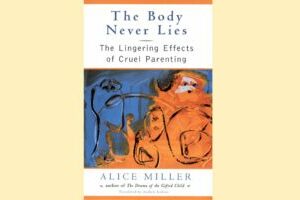From alice-miller.com/Stephen Khamsi, PhD: “Tragically, much of psychology is comprised of nonsense and noise…rats, statistics, medications. So we are fortunate to receive the rare and exceptional work of Alice Miller. Her most recent volume, The Body Never Lies, continues one of psychology’s most important collections.
There is an unwritten law, an unacknowledged commandment, that adults may exploit children in extreme ways and in accordance with their needs and neuroses. There is, moreover, a social taboo against recognizing any of this. Parents are protected while children are sacrificed.
Dr. Miller’s chief concern has always been childhood suffering, its denial, and the lasting effects on individuals and on societies. The focus of her current book? The denial of real emotions – the tension between what we really feel and what we ‘should’ feel – and the enduring effects on the body. Real feelings are direct and visceral, and real feelings conflict with morality. The author’s hope is to reduce personal suffering, isolation and tragedy.
Our bodies, according to Miller, keep an exact record of everything we experience. Literally. In our cells. Our unconscious minds, moreover, register our complete biography. If emotional nourishment was absent during childhood, for example, our bodies will forever crave it. ‘Negative’ emotions, to take another corporal example, are important signals emitted by the body. If ignored, the body will emit new and stronger signs and signals in an attempt to make itself heard. Eventually there is a rebellion. At this point, illness often results. The body is tenacious as it fights our denial of reality.
. . . In The Body Never Lies, Miller pays particular attention to the Fourth Commandment – the edict that one must honor one’s parents, no matter their conduct. For thousands of years, this commandment – in concert with our personal denial of early maltreatment – has led us toward repression, emotional detachment, illness and suicide. This Commandment, suggests the author, is a species of morality ‘that consigns our genuine feelings and our own personal truth to an unmarked grave.’ While many of the Ten Commandments remain valid, the Fourth Commandment is diametrically opposed to the laws of psychology.
To illustrate her ideas, Miller provides brief portrayals of Fyodor Dostoevsky, Anton Chekhov, Franz Kafka, Friedrich Nietzche, Friedrich von Schiller, Virginia Woolf, Arthur Rimbaud, Yukio Mishima, Marcel Proust, James Joyce, Saddam Hussein, and Adolf Hitler.
What do these writers, dictators, serial killers and others have in common? They all lived their lives in accord with the Fourth Commandment. They honored their parents, even though and even while their parents did them harm. Each individual sacrificed their truth in the unanswered hope that they would be loved, and each died in denial and isolation, tragically unable to admit to their own personal truths. These lives and these stories lend credence to Miller’s argument that moral laws lead to repression and to emotional detachment.
. . . Sadly, many of us were unloved, neglected and abused. The remedy? While there are no simple answers, we do know that the body is healed when one admits to personal truths and to real feelings. But how do we admit to such truths and to such feelings? We need to feel our pain and our powerlessness so that we can, paradoxically, become less pained and more powerful. We need to admit to our ‘negative’ emotions and change them into meaningful feelings. And we need to see through poisonous pedagogy in order to embrace and to embody integrity, awareness, responsibility, and loyalty to oneself . . .
Techniques of converting ‘negative’ emotions into ‘positive’ emotions will fail. Why? Because these manipulations reinforce denial, rather than leading to honest confrontations with one’s authentic emotions. And forgiveness, Miller reminds us, has never had a healing effect . . .
Still, Miller retains a hopeful view of the future. While society at present always sides with the parents, individual bodies are fighting against the lies. It’s possible that our collective body may rise up and lead to a future society built on conscious awareness. First, though, we must jettison our ‘fundamentalist faith’ in genetics and, I would add, pharmaceutical ‘miracles.’ With the help of a witness, each damaged individual needs to move through infantile fears and reject the illusion that our parents will save us. When we finally experience our real truths of being unloved, neglected and beaten; when we internally separate from our parents; when we experience love for the worthy child we once were…only then our bodies can experience rest and relief, and only then can we get on with the important business of real life.”

***
Back to Around the Web











